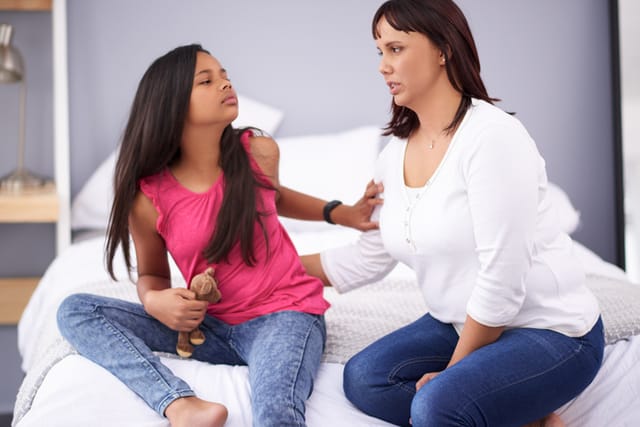Growing up, you might have noticed that your relationship with your parents wasn’t like your friends’ but you weren’t really sure why. You assumed maybe your mom or dad was just a little different, or maybe that the way they treated you was down to something you were doing wrong. In reality, it’s possible that you had an emotionally abusive parent but just didn’t realize it at the time. Here are some signs that might have been the case.
1. You always felt like you were walking on eggshells.

Home should be a safe haven, but for you, it might have felt more like a minefield. You were constantly on edge, monitoring their moods and trying to avoid triggering an outburst. This emotional tension left little room for the carefree joy of childhood and instead created an environment more like a battlefield than a home.
2. You became their emotional punching bag.

Instead of being nurtured and comforted, you might have found yourself serving as an outlet for your parent’s frustrations. Frequent, unwarranted outbursts directed at you create a harmful, one-sided relationship that no child should have to endure. This emotional dumping ground is not a healthy environment for a child and can lead to long-term psychological damage.
3. You felt like their love was conditional.

Love that’s given sparingly and only when specific demands are met can feel like a prize in a never-ending competition. This conditional affection can leave lasting scars on your self-esteem and self-worth, making you feel like you’re always falling short. Such a transactional approach to love can distort your understanding of healthy relationships.
4. You were constantly criticized.

Life is a learning curve, and everyone makes mistakes. However, if you were persistently criticized in a demeaning way, it likely eroded your confidence and left you in constant fear of failure. This relentless disapproval can create an unhealthy fear of making mistakes, hindering your ability to learn and grow.
5. Your needs were often ignored or neglected.

Every child has emotional needs that are as vital as physical ones. If your feelings were often dismissed or overlooked, it can lead to a lingering sense of insignificance and a belief that your feelings don’t matter. This emotional neglect can impact your relationships and self-perception in adulthood.
6. They blamed you for their mistakes.

Being unfairly blamed for your parent’s missteps places an undue burden of guilt and shame on your shoulders. Over time, this wrongful blame can make you feel like a scapegoat in your own home. This pattern of blame-shifting can lead to a distorted sense of responsibility and guilt.
7. They controlled you by using fear.

Fear is a powerful tool of manipulation. If threats and intimidation were common tactics used by your parent to control your behavior, it likely left you with deep-seated anxiety and a feeling of powerlessness. This environment of fear is far from the nurturing and safe space a child should grow up in.
8. You were gaslighted.

Gaslighting is a manipulative tactic where the abuser distorts reality to make you question your own memory and perception. This mind game can lead to a profound sense of insecurity, confusion, and self-doubt. It’s a form of psychological abuse that can have long-lasting effects on your mental well-being.
9. They never offered you much affection.

A lack of affection and warmth in a child’s life can lead to feelings of rejection and loneliness. If expressions of love were sparse or missing from your childhood, it could have made you feel unloved or unwanted. This absence of affection can make it difficult to form healthy, loving relationships later in life.
10. They dismissed your achievements and all the things you did right.

When your achievements and successes are routinely downplayed or ignored, it can rob you of the joy of accomplishment. Over time, this dismissive attitude can lead to a lifelong struggle for validation and recognition. It also makes it really hard for you to celebrate the things you achieve as an adult — you just never learned how.
11. You often felt isolated and alone.

Being cut off from peers and other supportive adults is a common tactic of emotional abusers. If your social interactions were tightly controlled, it likely left you feeling alone, deprived of the essential support network everyone needs. This isolation not only robs you of necessary social skills but also makes it harder to reach out for help.
12. You became their adult confidant.

Children should be shielded from adult problems, not burdened with them. If your parent overshared their issues with you, it may have caused significant anxiety and forced you into a role you weren’t ready for. This inappropriate oversharing can lead to emotional overload and rob you of a carefree childhood.
13. They constantly compared you to other people.

Being compared to other people in negative ways can severely damage a child’s self-esteem. This kind of comparison can lead to a lingering sense of inadequacy and a fear of never measuring up. Maybe you felt like you always had to compete with a sibling or one of your parents’ friends’ kids, who your parent believed was so much better than you. That’s emotional abuse!
14. You never heard them apologize when they hurt you.

If your parent never took responsibility for their harmful actions or words, it likely normalized the abuse in your mind. This lack of accountability can lead to a distorted understanding of what healthy relationships should look like. It also teaches you the wrong lesson that admitting mistakes is a sign of weakness, not strength.
15. You were made to feel unworthy or not good enough.

Feeling constantly belittled and made to believe that you don’t deserve love, respect, or kindness can leave deep emotional scars. This kind of emotional abuse can affect your self-worth and influence your relationships in adulthood. Plus, this kind of persistent negative messaging can see you end up in a toxic cycle of seeking validation in the wrong places.
Enjoy this piece? Give it a like and follow Bolde on MSN for more!


